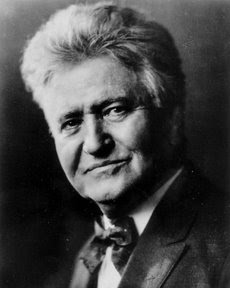Good morning,
Whitewater’s forecast calls for a day with likely showers and a high of seventy-one degrees.
In the City of Whitewater today, there’ll be a Planning Commission meeting at 6 p.m. The agenda for the meeting is available online. I will live blog that meeting tonight, using different software from previous live blogging efforts. I wouldn’t expect anyone to read my comments live; instead, I’m interested in experimenting with live blogging to produce commentary more quickly, and to test of the format.
The Wisconsin Historical Society recalls the anniversary of a prominent politician’s birthday. On this date in 1855,
… Robert M. La Follette was born in Primrose, Dane County. A renowned lawyer, politician, governor, and U.S. Senator, La Follette was the son of a prosperous, politically active Republican farmer who died eight months after Robert was born. Robert grew up on his family’s farm and entered the UW in 1874. While a student at UW, he edited the campus newspaper and was strongly influenced by the teachings of John Bascom. After receiving a B.A. in 1879, he studied law and was admitted to the bar in 1880. The same year, he was nominated and elected district attorney over the opposition of local political boss Elisha W. Keyes. On December 31, 1881 he married his college sweetheart, Belle Case. In 1884 he was elected to Congress, again defeating Keyes.
Known as “Fighting Bob”, he actively advocated conservation, preservation of public lands, and conservative public spending. Defeated in the 1890 election, he returned to his Madison law practice but remained active in state politics. He served as governor from 1900 to 1906, where he pushed a broad reform agenda which became known as “the Wisconsin Idea.” As governor, he enacted a program that included direct primaries, more equitable taxation, a more effective railroad commission, civil service reform, conservation, control of lobbyists, a legislative reference library, and bank reform.
In 1905 the Wisconsin legislature elected La Follette to the U.S. Senate. He was a controversial senator almost from the beginning. After William Howard Taft became president, La Follette forged the progressive Republican opposition to the Payne-Aldrich Tariff and became a persistent critic of the administration. In 1909, he founded La Follette’s Weekly Magazine (later known as The Progressive) to promote his ideology. In 1911 he was chosen as the progressive Republican candidate to displace Taft, but he was superseded by Theodore Roosevelt in 1912. La Follette supported most of the policies of Democratic President Woodrow Wilson until the question of U.S. entry into World War I arose. Vigorously opposed to entry, he was the victim of an unsuccessful attempt to expel him from the Senate for an antiwar speech. In the postwar period La Follette resisted the anti-Communist scare and fought for the interests of workers and farmers against the business-oriented Republican administrations. He initiated the investigation into the Teapot Dome scandal in 1922.
In 1924, he ran for president on the Progressive Party ticket but lost to Calvin Coolidge. He died on June 18, 1925, still a fervent believer in democracy. Both of La Follette’s sons, Robert Jr. and Philip, carried on his political ideals after his death. La Follette was one of the most eloquent orators of his time, consistently speaking out in favor of popular democracy and in opposition to government by special interests. He is regarded as one of the most important Progressives in American history. [Source: Dictionary of Wisconsin Biography, SHSW 1960, pg. 217]
There are parts of the La Follette’s career and advocacy that I consider mistaken (opposition to Coolidge being one of them), but his impact on Wisconsin and American history, an impact resting on firm, principled advocacy, is undeniable.

